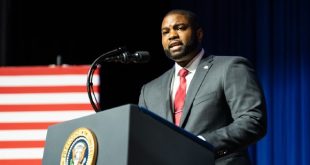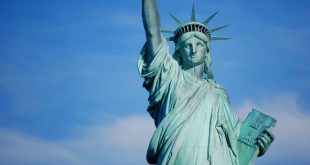In 2014, high-tech executive and CEO of Mozilla Brendan Eich was forced to resign from the company he helped found and build, because he made a $1,000 contribution to support traditional marriage in the California marriage referendum.
According to accounts, Eich was subject to vicious attacks through social media for his contribution in the marriage campaign.
Mozilla chairwoman, Mitchell Baker, observed, “Mozilla believes in both equality and freedom of speech. Equality is necessary for meaningful speech. And you need free speech to fight for equality. Figuring out how to stand for both at the same time can be hard.”
That Mozilla’s chairwoman could offer such a confused, vacuous explanation for Eich’s dismissal sheds light on why the overall state of affairs in the country is such a mess.
Free speech is not about equality. Free speech is about the pursuit of truth. The equality necessary for free speech is equality under the law, where everyone receives equal protection. But when politics is the aim rather than truth, objective law protecting free expression gets flushed, and political operatives, like Baker, determine who lives and who dies.
Two years earlier, Crystal Dixon, a black Christian woman, was fired from her human resources position at the University of Toledo because she penned an op-ed for the local newspaper challenging the proposition that the gay rights movement is a new chapter of the black civil rights movement.
Carefully reasoned discourse — which is what Dixon offered in her fatal op-ed — is not welcome in a politicized society, because the pursuit of truth is no longer relevant. Only behavior consistent with predetermined political ends is.
This slippery slope leads in one direction. Less freedom and more oppression. Exactly what our nation is not supposed to be about.
It shouldn’t surprise us, then, that Gay Pride Month has become a time for LGBTQ storm troopers to pursue political enemies. Not much different from the infamous Kristallnacht in Nazi Germany, when Nazi brown shirts took to the streets to smash windows of shops owned by Jews.
Thus among the stories of this Gay Pride Month:
Another high-tech executive, the CEO of Twitter, with an estimated net worth of $5 billion, was forced to offer a social media apology for eating a chicken sandwich in Chick-fil-A. Patronizing a fast-food establishment whose CEO is a devout Christian, with the temerity to have criticized the Supreme Court decision legalizing same-sex marriage, is a high crime in the eyes of the LGBTQ judges and jury.
Russell Berger, chief knowledge officer of CrossFit, was fired for tweeting his support of a company decision to cancel participation of a CrossFit gym in Indianapolis in Gay Pride Month events. Berger, a seminary trained pastor, was perhaps excessively inflammatory because he used the word “sin.” If there is any “sin” in today’s politicized America, it is to claim that sin, in the biblical sense, exists.
A Muslim Uber driver was fired for asking two lesbian passengers to leave his car after they began kissing and embracing.
Last year, my office in Washington had to temporarily close because of threats when, in a cable TV interview, I equated the LGBTQ rainbow flag to the confederate flag. From my point a view, it’s a totally reasonable assertion. As a black American, the Confederate flag communicates to me that I am not welcome. As a Christian American, the rainbow flag communicates to me that I am not welcome.
According to a recent Gallup survey, 41 percent of Americans identify as evangelical Christians. Will the course of events in LGBTQ-controlled America preclude them from shopping, working, speaking, existing in our nation’s public spaces?
The preamble of our constitution says that “We the people” establish this constitution in order to “secure the blessings of liberty to ourselves and our posterity.”
The direction of events indicates that “our posterity” has much to be concerned about.
COPYRIGHT 2018 STAR PARKER
DISTRIBUTED BY CREATORS.COM
 Star Parker is the founder and president of the Center for Urban Renewal and Education. Contact her at www.urbancure.org.
Star Parker is the founder and president of the Center for Urban Renewal and Education. Contact her at www.urbancure.org.
 Black Community News News and Commentary for Christians
Black Community News News and Commentary for Christians




Full disclosure: I am white. When I was growing up in the 1970s, I’d sometimes see people flying the Confederate flag on their front porch, or hanging it up inside their house, or in their garage. I asked my relatives about them, and what they told me was that it has a history from the Civil War, but that people just fly it to say that they are a rebel, in the general sense, not in the “North against the South” sense. From that understanding, I thought there was nothing racist about it. Later, as I learned the history of the Civil War, I learned that it represented the Confederacy, and what it stood for at the time. The popular culture of the 1970s and ’80s seemed to embrace this idea that the Confederate flag was not racist, again, just a way of being rebellious. For example, a popular show that ran for years on network television was “The Dukes of Hazzard,” which featured a muscle car that had the Confederate flag emblazoned on its roof, and a couple of young guys who drove it who would get into trouble flaunting the law (that was the rebellious part), though without malicious intent towards others in the community. There wasn’t a racist word or notion uttered throughout the whole series. It was just sort of about the “devil may care” nature of youth.
Maybe the popular meaning of the Confederate flag has changed, and it’s only racists now who embrace it now. I don’t know, but when I read you saying that where you see a Confederate flag, you don’t feel welcome, I thought I should say something about that. It may not be true that you’re not welcome.
I heard a story from an jewish acquaintance just in the last couple weeks that he was stranded by the side of the road with some car trouble, and a guy in a pickup truck, flying little Confederate flags, stopped to help him. He said seeing the flags, he expected trouble, but the guy turned out to be just as nice and charitable as he could be. He was surprised. When he told the story later, one of his friends asked him what made him think seeing the Confederate flag meant trouble? He said, “Social conditioning.” Just something to think about.
You’re absolutely right about the acceptance in the 70’s and 80s of the Confederate Flag as a symbol of rebelliousness.
I am also white (think Pillsbury Doughboy), but I was growing up in the 50’s and 60’s. I can say that race relations in the 60s were better than they have been in the last 9 years. They were better in 2008, but went downhill rapidly. Relations between any two groups of people you could name have been fractured since then.
When I was very young, I felt a little nervous about the Confederate Flag, but seeing the alternate feeling toward it changed that. Also, I couldn’t help but notice that every time I saw a photo of a group of Klansmen or Neo-NAZIs, they might have a Confederate or NAZI flag in the photo, but they would also have a US flag there. How could I think that the US flag stood for hate? I began to think that if those bigots could be wrong about what the US flag stood for, using it like that, perhaps they were misusing the Confederate Flag also. I have never seen the NAZI flag used to promote a sense of rebellion. They prefer lockstep and groupthink. If it wasn’t for the American Revolution we would never have produced people with a sense of rebellion in their souls.
Already we have seen people being told that the US flag must be taken down from their apartment balconies and schoolkids have been told not to wear T-shirts with the US Flag on them. That makes me feel many who go after the Confederate Flag are insincere.
For years, since the “Dukes” no one complained about the Confederate Flag. It wasn’t until all those “bitter clingers” started getting vocal that people started complaining. I got the feeling that they were being demonized on purpose so the rest of us wouldn’t join with them.
Only one thing to do: FIGHT BACK! Remember Richard the Lionheart was a Christian as well as St Francis of Assissi.
Star, you’re right that we (especially Christians) and our posterity have much to be concerned about. And the onus and burden will always fall on Christians to be the more loving and forgiving. But that’s OK; we have a Merciful, Loving and Gracious God Who gives us the power and wisdom to meet that challenge! The Call is to do so without compromising our Lord and our principles. It may sound trite, but I think the key is to love the sinner, but not the sin. There is no backing down from the fact that homosexuality is declared by the Bible as sin. But when I’m challenged I make it clear that I’m troubled by my own sin(s) more than anyone else’s. And hopefully, I let my lifestyle and behavior show that I hate no one because of his sin.
Love you!
“Let he who is without sin cast the first stone.” That’s about as good as anyone can do.